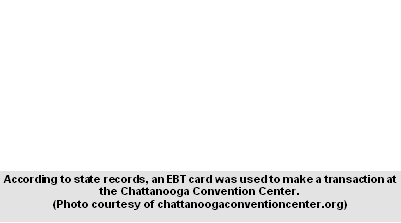|
"It's likely that this is not a case of people simply withdrawing money from an ATM machine in front of or inside a business. As it would on a bank statement, an ATM withdrawal would be documented as just that -- an ATM withdrawal," Taylor said.)
According to state records, an EBT card was used to make a transaction at the Chattanooga Convention Center (Photo courtesy of
chattanoogaconventioncenter.org)
• The Honest Pint restaurant and bar accepted a $22.50 EBT transaction on June 5, yet the restaurant/bar does not accept EBT cards as transactions, said owner Matt Lewis.
"As far as I know, we are not able to run those cards."
• Almost $265 in transactions were made with EBT cards at two USPS offices in Chattanooga. One transaction, dated June 22, was for $216.15.
New DHS Rules
Officials with the Tennessee Department of Health and Human Services (DHS), who administer the program, sent the records of the EBT transactions to Tennessee Watchdog in response to an open records request.
In the e-mail with the requested records attached, DHS spokeswoman Valisa Thompson acknowledged that transactions occurred at businesses that sell non-essential items.
"A small percentage of the swipes took place in settings like bars or strip clubs."
Thompson made the statement before Tennessee Watchdog began investigating the records.
According to state records, an EBT card was used to make a $182 transaction at a Knoxville Super 8
"For background information, we want to make you aware that the Department is working pursuant to the Middle Class Tax Relief and Job Creation Act of 2012, enacted into law in February 2012, in order to ensure that TANF funds are not abused," Thompson said.
Thompson added that DHS, with help from federal agencies, is developing a plan to prohibit EBT transactions at liquor stores, casinos, gaming establishments, and adult-oriented establishments. The plan will go into effect July 2014.
The plan as described will not prevent transactions at malls, hotels and motels, or beauty supply stores, as they occurred in Chattanooga and Knoxville.
Lawmakers in numerous states are also pursuing legislation to ban the use of EBT cards for the purchase of alcohol, tobacco, and other non-essential items.
Tennessee spends $127 million annually on this TANF program, approximately 16 percent of which comes from state tax dollars. The federal government covers the remainder.
.
|
|
